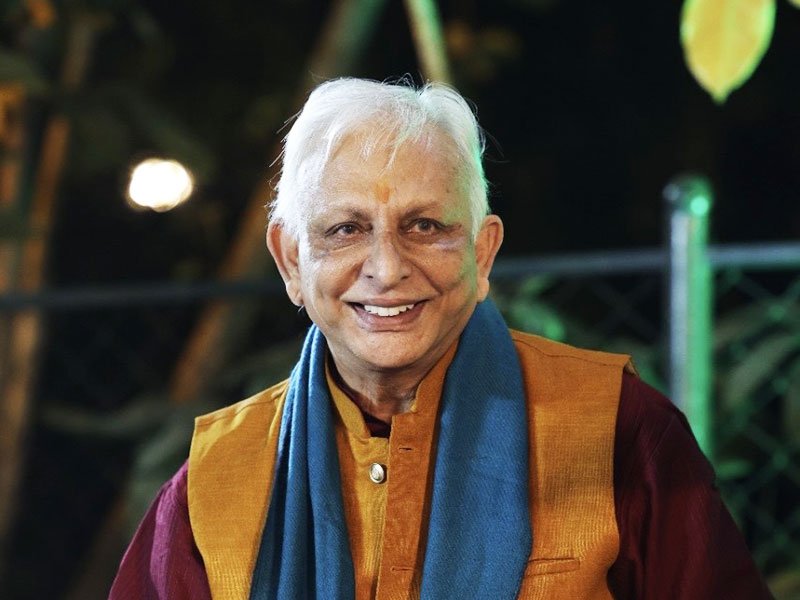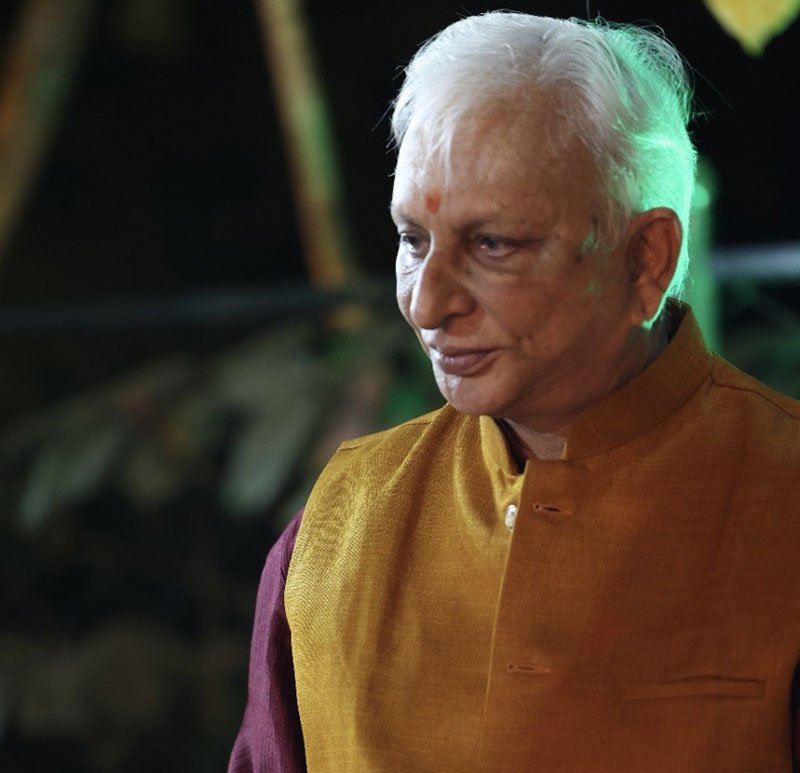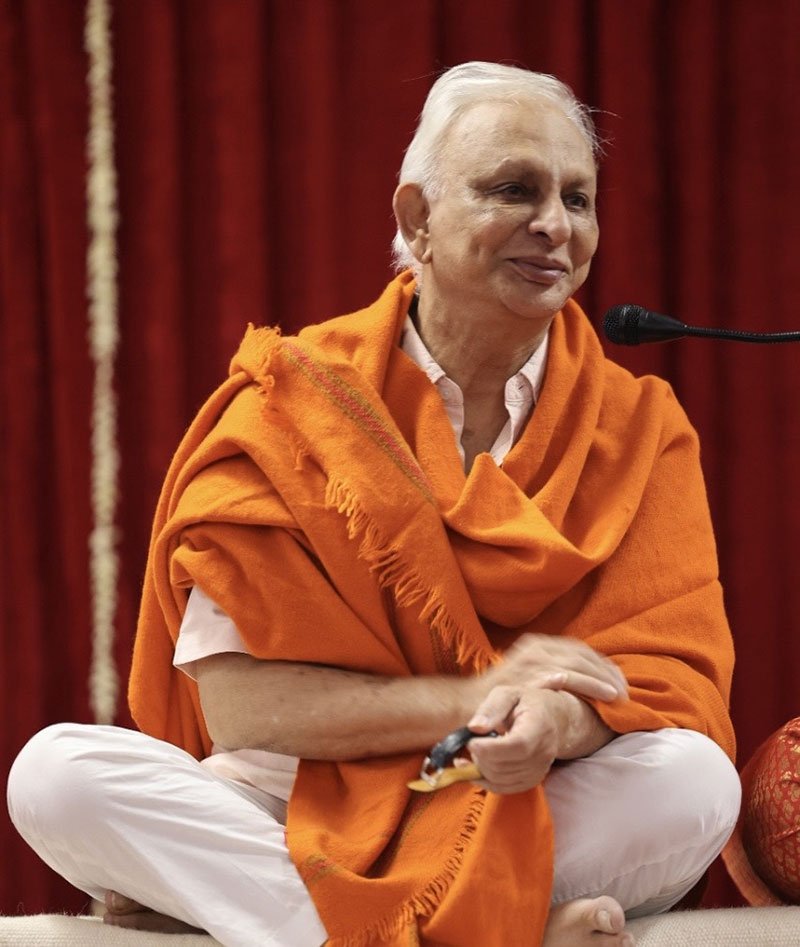
Sri M narrates the story of Nachiketas, a young boy, discussing the important question of Death and immortality with Yama, the Lord of Death.
“The sage, Vaajashravasa, desirous of heaven, performed a sacrifice in which he gave away all his possessions. He performed the Vishvajit sacrifice to win the entire universe, so that he could attain the svarga loka – “heaven”.
He had a son called Nachiketas. The word nachiketa means “one who does not understand”, and therefore wants to understand. But Vaajashravasa feels that he has understood everything: he knows what he wants to get and he is giving away everything for that. Here is the son, still young, and with an open mind who does not understand and therefore wants to understand the Truth.
The son watches his father giving everything away in sacrifice in order to attain svarga loka.
“When the gifts were being given away to the priests, shraddhaa entered into the heart of the young boy, and he thought”
shraddhaa has been loosely translated as “faith”. shraddhaa means all these things put together: faith in one’s self, one-pointedness, total attention to the real as opposed to the unreal, to the true as opposed to the hypocritical. That shraddhaa, for understanding the Truth, entered the heart of the young boy Nachiketas.
Nachiketas saw the decrepit cows that were being presented to the priests. They were so old and useless that their water was “drunk”, meaning that all their body fluids had dried. They seemed to have “eaten their grass”, meaning nothing more remained to be eaten. Their milk had been exhausted and there was no more strength left in their senses or indriyas. They had become useless.
Nachiketas wondered, what joyous world or svarga, can one hope to reach when all one has to give is something that is spent and useless?
This means, when we have used all our energies for useless things and when all the energy has gone, if we want heaven, what do we have left to give? All has been spent, nothing is left. If one has nothing to give, what will one sacrifice?
Cows here are only symbolic. It means that when everything has been spent and one thinks of going to the higher spheres, then there is nothing left to give to go there. The entire life is wasted.
Nachiketas could not keep quiet, for it had entered his heart. He was compelled to speak to his father.
“He said to his father, ‘Father, whom will you give me to?’ And he repeated this question for a second and third time. The father heard this and said, ‘I will give you away to Death.’”
Hearing his father’s words, Nachiketas, though a young boy, thought about death as nothing peculiar. “Everybody has to die and I too am going to die. I am in the middle because so many have gone before me to death; so many more will follow me to death. I go as the middling.”
He wondered what duty his father would accomplish by sending him away to Death. Then he continues to think about life, death and rebirth: “It was the same with my forefathers; it was the same also with men who come later. Just like corn, a mortal ripens, falls and is born again.”
First the corn is green, then it ripens, then the seeds fall and new corn is born. This goes on eternally. Later, one decays and is reborn and the whole cycle is repeated. Nachiketas does not at all doubt the existence of life after death. He knows that like corn, one has to be born again.
Thinking about all this, Nachiketas goes to Yama Loka, the Realm of Death. As the story goes, when Nachiketas enters Yama’s world, Yama is away. Nachiketas waits there for three days, without food, for Yama to return.
How did Nachiketas enter the House of Death? He did not enter like an ordinary person, crying and weeping and fearing that he had to leave the earth behind. He entered like fire. He went with the intention of studying what death is. He had not gone there because he was compelled to go, he had not gone fearing what would happen on the other side, nor had he gone with any desire left behind.
After three days, Yama returned and was surprised to find this boy there. Yama is told about the arrival of the boy. How?
Like the universal fire, this braahmana guest entered into the house. When this young braahmana guest entered, shining like fire, he was given respect and the peace offering of water. But Yama was not there to do that himself. So Nachiketas, whose desire was to know the Truth, refused everything and waited without food and water for three days for Yama to arrive.

Yama comes to Nachiketas, who was sitting outside his house and says to him: “O Braahmana, I bow down before you, respected guest. You have waited for three nights outside my house without food. Obeisance to you, O seeker of the Truth, and welfare be to me. For each of the three nights, therefore, choose three boons.”
The calm Nachiketas asks for the first boon from Yama: “May my father, Gautama, be without any anxiety. With his anger gone, may he be gracious to me, O Death. May he recognize me and greet me, when you send me back from here. This is the first of the three boons I choose.”
Nachiketas asks Yama for the first boon, that his father Gautama should greet him without anger and recognize him when he returns. Here, the name “Gautama” is also used to refer to Nachiketas’ father. Earlier, his father’s name is mentioned as “Vaajashravasa”. In the Upanishads, names are interchangeable. “Gautama” occurs in many other Upanishads, as in the Chandogya Upanishad, where there is a Gautama, who is the son of Haridrumat and the guru of Satyakama Jabala.
This not only applies to the father in the story, but to others as well. Many times, the person who has found the Truth and gone back is not recognised. After finding the truth one is different; one is not the same person again. Not only do people not “recognize” that person but instead of welcoming him with happiness and joy, they may persecute him. Many people who have found the Truth have been persecuted. So it is a genuine request that Nachiketas makes.
Yama tells him not to worry.
He says: “Through my favour, he will also recognize you, as of old, in the same way as Uddhalaka recognized his son Aruni. Seeing that you have been released from the jaws of Death, no more will he have any anger left and he will sleep peacefully through the nights.”
“When you go back from here, you will be free forever from death,” which means, “no more will death frighten you for you will understand what is real life and what is immortality.” Therefore, you are “released from the jaws of Death.”
Then Nachiketas asks about the world of heaven: “In the world of heaven, there is no fear whatsoever. You, Death, also do not go there and there is no fear of old age. There is no hunger and there is no thirst and therefore, leaving sorrow behind, one rejoices in the world of heaven.”
Nachiketas asks for the second boon: “O Death, you know that fire-sacrifice, which is an aid to heaven. Please describe it to me as I am full of faith. Tell me that secret by which one can gain immortality in heaven. This, I choose as my second boon.”
As his second boon, Nachiketas asks Yama to tell him about that secret of the fire-sacrifice, that technique of reaching svarga loka, where there is no fear of old age or of death, where one lives for ages, rejoicing in happiness.
Yama replies: “I know that fire which will take you to heaven. I will describe it to you. You learn it from me, O Nachiketas. That fire is the means to attaining the boundless world of heaven. It supports the entire universe and resides in a secret place within you.”
All the acharyas have interpreted “fire” as “desire”. That is the fire of the desire for Truth. It is the same fire which is also the desire for happiness.
What is this desire that keeps us evolving, keeps us moving in this world? It is the desire for happiness and it is like a fire that burns in us all the time. While it is burning, it is wonderful; when it has finished burning, it becomes ash. It is this same fire which is also the search for the Supreme Being. The difference is, here it burns up and there, it burns down!
That fire resides in a secret place within the heart. “Heart” does not mean the physical heart; it means the “centre of one’s consciousness”.
So Yama said, “I will teach you that fire-sacrifice.” He described it to him and taught him how to reach svarga loka. Nachiketas understood clearly what was taught and repeated it exactly as it was told to him. Death was delighted. Being so pleased, Death gave him an additional boon:
“The great Death was extremely delighted and he said to Nachiketas, ‘I am giving you an additional boon. From now on, this fire-sacrifice will be named after you. Also, take this splendid chain of many shapes.’”
Then Yama describes what happens to the one who performs the “Nachiketas fire” thrice. He says: “He, who has lit the Nachiketas fire thrice, associating with the three, having performed the three acts, crosses over birth and death. And knowing the Son of Brahman, the omniscient, the resplendent and adorable Agni, and realizing Him, he attains everlasting peace.”
There are a few terms that have to be explained here. “He, who has lit the Nachiketas fire thrice”, refers to the seeker who has understood “that” fire: he knows that in the inner being, fire of desire, of wanting to attain immortality, burns strong. He has lit the fire already and he has lit the fire thrice.
So when a seeker lives performing the three acts, associating with the three and having lit the Nachiketas fire thrice, he crosses over birth and death. Knowing the Son of Brahman, he attains everlasting peace.
So this boon is for attaining svarga loka, which is considered to be one step lower than the Brahman.
Such a wise man who purifies himself in meditation, not only in the physical body but also in the subtler levels of consciousness, “throws off the bonds of death, and overcoming sorrow, he rejoices in the world of heaven, in svarga loka.” But still, he remains in svarga not reaching beyond.
Yama then asks Nachiketas to choose his third boon. He says:
As his third boon, Nachiketas asks Yama to clarify a doubt: “There is this doubt – some people say that a person who has departed continues to exist somewhere. Others say he does not. I would like to know this from you. Please tell me. This is the third boon that I ask.”
What Nachiketas wants to know is: What happens to a person when he is free? When one has attained spiritual freedom, when one is free from the surroundings, when one is free from the conditionings of this world, then what happens to one? Does one exist or not? Which means, is there only that Supreme Being in all its majesty? Or, is there also one little self inside enjoying It, or is the self merged with it? What is the Truth?
When Yama hears the question, he knows the seriousness of it.
Yama thought to himself, “I want to first find out if this fellow is really serious, or if he is trying to ask me for the sake of argument.”
Yama wants to find out how serious Nachiketas is. Is his interest, really, in finding the Truth alone? Or, is his interest in finding his own way of happiness in the name of Truth? Or, is he looking for entertainment, thinking that it is the Truth? This is a serious thing.
To find out how serious he is, Yama says to Nachiketas: “Even the gods of ancient times had some doubts about this point. It is not easy to understand. It is as subtle as the atom. So choose another boon, O Nachiketas. Do not compel me! Please release me from this problem.”
Yama discourages him because he also wants to find out how strong and clear Nachiketas is on wanting to know the Truth.
In response to Yama’s plea to not ask him that question and to ask for anything else, Nachiketas replies: “Even the gods had doubts about this, O Death, and you say it is not easy to understand. It is not easy to get a teacher like you on this subject. So I believe no other boon is equal to this.”
Yama then tries another technique to discourage him.
“Choose sons, grandsons, who will live a hundred years; choose cattle in plenty, elephants, gold, horses; choose vast expanse of land and yourself live as long as you want.” In those days, cattle meant wealth.
Yama continues to offer more to Nachiketas: “If you think of any other boon equal to this, ask. Choose also wealth and long life, O Nachiketas. Prosper on this vast earth. I will make you the enjoyer of all desires. Choose!”
Yama continues to tempt Nachiketas: “Whatever desires are hard to attain in this world of mortals, ask for them, as you will. There are noble maidens with chariots and musical instruments, the like of whom cannot be won by men. Be served by them, whom I give to you. But Nachiketas, do not ask me about death.”
This is the test for Nachiketas.

But, Nachiketas is not impressed. He says to Yama: “All these are transient, O Death. They wear out the vigour of all the senses in man. And the whole span of life is but short. So, keep the horses, song, and dance, for yourself.”
He continues: “Man never get content with wealth. Having seen you, shall we enjoy wealth? Shall we live as long as you rule? That alone is the boon chosen by me.”
Nachiketas says sensual pleasures are ephemeral and there is no point in asking for them. He makes it clear that he has no interest in these things.
Nachiketas asks Yama for the answer to that mystery, about life after death, about which there is a doubt.
Yama is now convinced that the boy is indeed ardent about finding the Truth. Everything had been offered to him by the Lord of Death Himself and he knew that it would come through, if he accepted it. Yet, he said, “I want nothing else. I only want to know about The Truth.”
Yama feels sure that Nachiketas is qualified to ask the question and he begins the teaching.

Yama begins to teach the pure-minded and qualified student Nachiketas and goes to the root of the enquiry.
The Upanishad does not directly say, “Yes, you exist,” or, “you do not exist.” It starts from the root of the problem and then guides you to discover the answer for yourself.
An excerpt from Sri M’s book, ‘The Upanishads ; Katha Upanishad.
Sri M will be delivering Talks on Katha Upanishad in Bangalore on 27-29 Feb 2024.
The webcast will be available on the official youtube channel of The Satsang Foundation.

